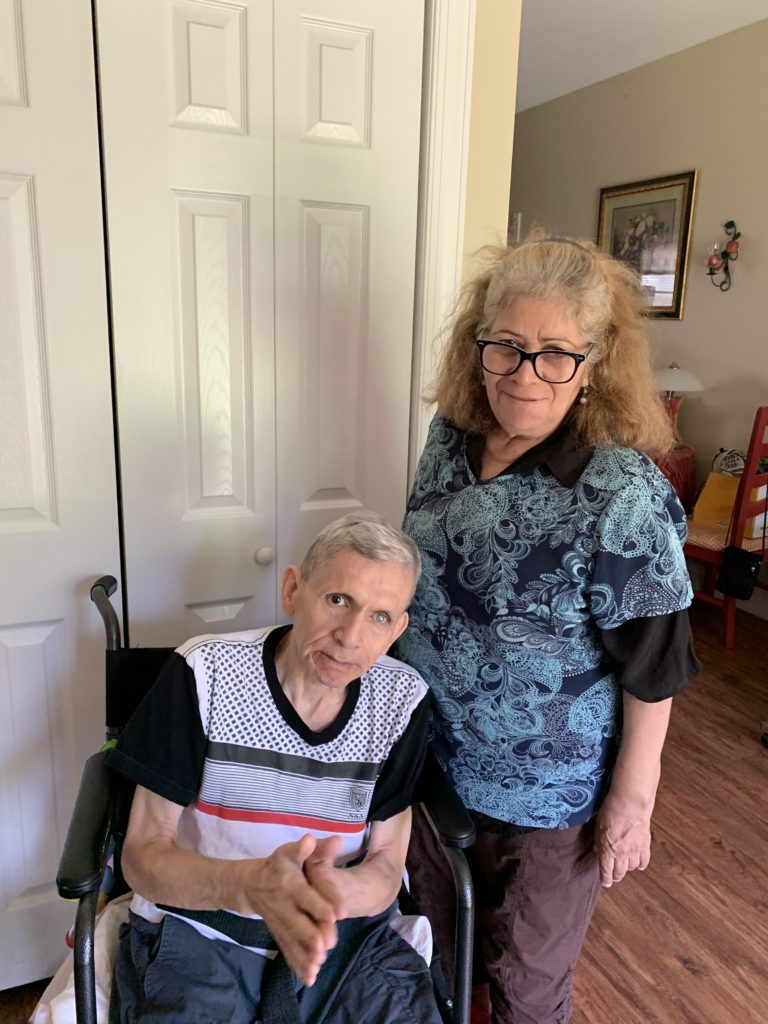
Hospice patient Orlando Miranda (left) and his wife and caregiver Lila Arevalo
Caregiving is one of the hardest jobs out there. Approximately 1 in 4 adults in West Virginia is caring for a loved one. Unpaid and overworked, mentally and physically exhausted, these selfless individuals have transformed their lives so that they can care for a family member or dear friend.
This is a lifestyle that the Miranda family knows well.
Orlando Miranda was diagnosed with dementia in 2013 at the age of 61. As his disease continues, the former Bowie State University maintenance man needs more looking after and care. In 2015 his wife Lila Arevalo had to quit her job at the University of Maryland so that she could care for her husband full time. Today Lila spends 24 hours a day, 7 days a week in their apartment caring for her husband, only going out when one of their two children or their spouses, who are raising young families of their own, are able to come sit with their father.
“I want people to know the effort that goes into giving the person you love the care that they need,” Lila recently said.
Caregiving is extremely physically, mentally and emotionally demanding. For Lila who struggles with pain and limited motion in one arm, she used to cry while trying to bathe, clean and dress her husband, who would often resist her care. Now she has come to depend on her husband’s hospice aides to take care of Miranda’s daily hygiene.
Miranda became a hospice patient in October, 2018, after a visit to the hospital. He had been losing weight steadily, needing more assistance to do routine tasks, and was now mostly bed or wheelchair bound.
Since October, the Miranda family has really learned that hospice care is as much about the caregiver as it is about the patient. While Orlando benefits from the nursing care and aide services, Lila is relieved of some of her caregiving burdens. She knows that the hospice aides will be there to help bathe and dress her husband. The nurses help her manage Orlando’s medications, and recommends and arranges for medical equipment like a chair or bed alarm that will help keep him safe by alerting Lila if he tries to get up without assistance. The hospice social worker helps the family navigate questions of insurance and possibly finding help from a local nursing facility.
The couple’s daughter Magali Miranda has worked with a grief counselor, learning how to better communicate with her mom about what they are going through with her dad’s disease. She talks about how she was in denial in the beginning because she and her dad had always been so close and it’s so hard to think about the end coming. She’s learned that it’s okay not to be okay.
Magali smiles though as she shows video of her dancing with her dad to Luther Vandross’ song “Dance with My Father.” In the video, Magali carefully helps her father step back and forth to the music, trying to assure that he doesn’t fall. The video was recorded in January as they celebrated Orlando’s 67th birthday.
Orlando has also come to the Hospice of the Panhandle inpatient facility for respite care. While most people would think that this provides a great break for Lila, a chance for a “little rest and relaxation,” what it really does is give her a chance to take care of her own health. The five days she has during his stay are filled with doctors’ appointments, getting bloodwork done and trying to meet all of her own healthcare needs.
Lila is also exploring using Hospice’s volunteer services to come sit with Orlando so that she can go to doctors’ appointments and take care of other necessities. She has done this once so far and it was very helpful.
“Slowly but surely,” she said, “I’m trying to get my own health taken care of.”
Their own health is just one of the hidden costs of being a caregiver. There is also the income lost when a family member has to, like Lila, give up a job to meet their loved one’s needs. Added to that is the tension between family members as they try to navigate shifting roles and responsibilities all while doing their best to care for children, other family members and their own day-to-day lives.
Despite the costs, most caregivers wouldn’t trade the time that they are spending with their loved one. The Miranda family cherishes every moment that they have with Orlando. Magali is sure to take pictures when her daughters climb up next to their grandfather in bed. They adore him and want to be near him.
“You have to take advantage of how they are at that moment,” Lila said, sharing some words of wisdom from her experience. “You want to give them as much time as you can because later that time is gone.”
Hospice of the Panhandle is a not-for-profit organization that has been supporting caregivers in the Eastern Panhandle since 1980. People are eligible for hospice care when their goal changes from seeking a cure to an illness to improving comfort and quality of life, typically in the last 6 months of an illness. For more information about how Hospice of the Panhandle supports caregivers and families, call (304) 264-0406 or go online to hospiceotp.org.
Ashley Horst is the marketing and fundraising coordinator for Hospice of the Panhandle. She has been educating the community on issues related to hospice and end of life care since 2008.
